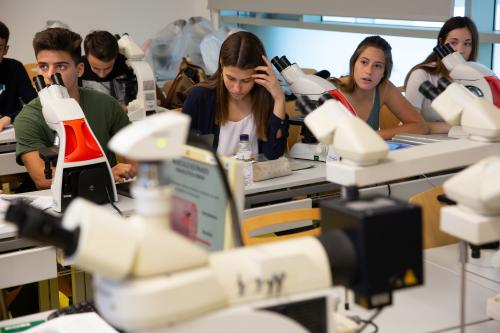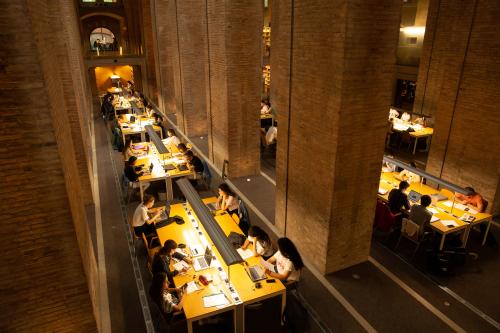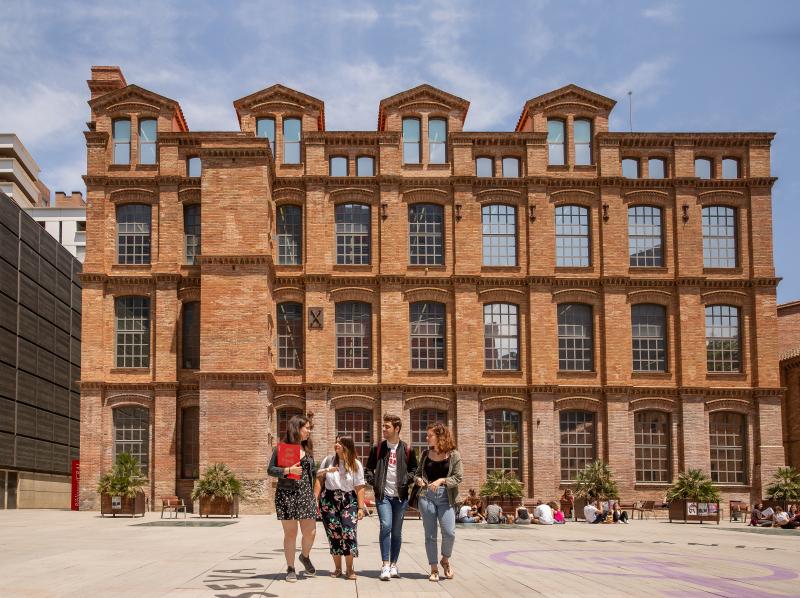You are here :
- EUTOPIA website
- Home
- About us
- Information
- Members
The Pompeu Fabra University-Barcelona
The UPF, in a few words
UPF is a public university based in Barcelona that is highly competitive in research and aims to transform education to respond to future challenges. It was founded in 1990 to create a public university focused on academic excellence and contributing to the country’s development.
As a university, it has been selective in the areas of knowledge it focuses on, specialising primarily in research and training related to the various dimensions of the human being, including biology, communication, and social phenomena.
In the context of significant global challenges, UPF has undertaken an imperative commitment as a university institution: to help find solutions for the main challenges facing humanity and the planet, as outlined in the Planetary Wellbeing initiative.
Internationalisation is also a critical orientation for UPF, distinguishing it as a university with “its feet in Barcelona and its head in the world”. Its international community, with the highest percentage of international faculty in Spain and one of the most international in Europe, its extensive and selected network of exchange agreements with universities worldwide, and global networks such as the EUTOPIA Alliance and The Guild, are proof of its commitment to international engagement.
Our Campuses
“An urban university, linked to the city of Barcelona, with a strong international reputation.”
One of the main founding principles of UPF is embodied in this quote: being a university in the city of Barcelona with a public vocation and commitment to the city. In its 34 years of existence, the establishment of successive UPF campuses has contributed to revitalising some neighbourhoods and areas of the city. This has fostered a specific relationship with public space, urban regeneration, business and industrial activity, knowledge institutions, and culture. Currently, UPF has three main campuses: Ciutadella Campus, Poblenou Campus, and Mar Campus.
The Ciutadella Campus is next to the famous Ciutadella Park and the Barcelona Zoo. This campus offers studies related to law, economics and business, humanities, and political and social sciences. The campus primarily occupies the premises of three buildings, which historically were military barracks. One of the most spectacular facilities is the Dipòsit de les Aigües, the UPF General Library, a building inaugurated in 1880 as a water tower to regulate the flow of water to the waterfall in Ciutadella Park and to irrigate its gardens. It is one of the most impressive libraries in Catalonia.
The Poblenou Campus is located in a former industrial space near the popular Agbar Tower within the so-called technological district 22@. It offers studies related to communication, translation and language sciences, engineering, and ICT.
The Mar Campus is located in the Barceloneta neighbourhood of Barcelona, next to the Hospital del Mar and the Barcelona Biomedical Research Park, facing Barceloneta Beach. This campus offers studies related to health and life sciences.
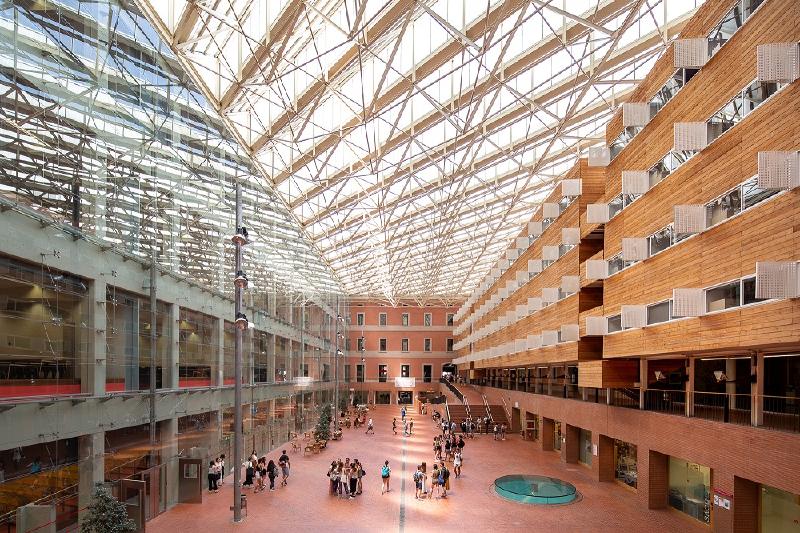
UPF in a few numbers
Pompeu Fabra University offers a wide range of disciplines, such as Medicine and Life Sciences, Political and Social Sciences, Communication, Law, Economics and Business, Engineering and Information and Communication Technologies, Humanities, and Translation and Language Sciences, spread across three urban campuses in Barcelona. A fundamental principle is teaching through a rigorous, innovative, and personalised educational model, nurturing individuals with solid scientific and cultural knowledge, cross-cutting competencies suitable for adapting to the changes and challenges of society, and the capacity to develop their life projects.For the academic year 2023-2024:
-
10,115 Bachelor’s degree students in 27 Bachelor’s degree programs
-
1,358 Master’s students in 33 Master’s programs
-
1,318 Doctoral students in 9 Doctoral programs
-
1,181 Full-time equivalent teaching and research staff
-
328 Permanent teaching staff
-
790 Technical and administrative staff
Excellence research
“A research culture open to the transfer of results and sensitive to their social impact, guided by the principles of responsible research and innovation”.
Under this motto, UPF leverages its research capabilities to meet global challenges. The research culture at UPF, based on responsible research and innovation principles, emphasises the transfer of results and their social impact. This model is made possible by the quality of the university’s teaching and research staff, as witnessed by UPF’s excellent research indicators regarding both research funding secured, especially in Europe, and scientific output. The results speak for themselves.
UPF is the first Spanish university in the percentage of papers published in the most influential journals, the first one in Spain in the percentage of papers published in collaboration with other Spanish institutions, and the second one in the percentage of papers published in collaboration with foreign institutions (Leiden, 2023). The competitiveness of UPF’s research is also outstanding. From the EU Horizon Europe program, 61 projects and €43 million were secured, including 21 ERC Grants (€26.6 million) and 16 Marie Curie Actions (€3.4 million). Moreover, from the EU Horizon 2020 program, more than 170 projects were secured, with 33 ERC grants and 64 Marie Curie Actions. The relatively small size of the university is not an impediment to being the first Spanish university in yearly scientific output and citation per lecturer and the first Spanish university in National Plan projects and EU Framework Programme projects per 100 lecturers (IUNE Report, 2023).
Some of the excellence research projects at UPF are related to Planetary Wellbeing, Imaging in Biomedicine, Artificial Intelligence in Natural Sciences, Blockchain, and Multilingualism and Cognition, with highlighted projects, research groups, and units leading top initiatives.
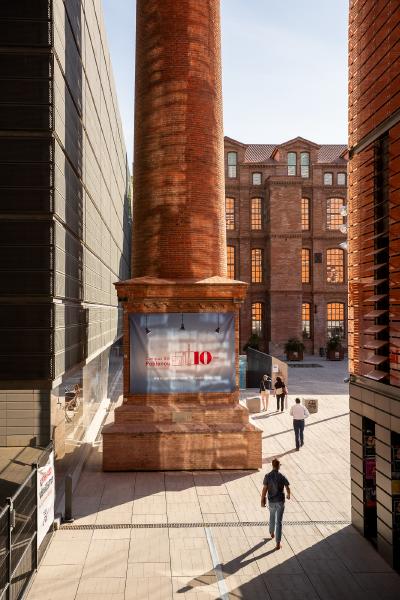
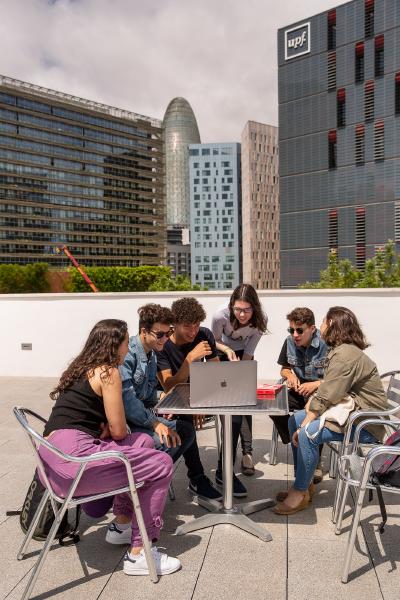
Internationalisation and alliances strengthen as a trademark feature
Internationalisation is one of UPF’s founding goals concerning the composition of its community and its training and research orientation. The ability to attract international talent at all levels is one of its trademark features.
With an outstanding position in international rankings as one of the top Spanish universities, UPF’s internationalisation was acknowledged by the Spanish Ministry of Education through the award of the International Campus of Excellence seal (2010) and is reinforced and confirmed as a vision for the future by its participation in the EUTOPIA project of European University.
Beyond that, UPF has a strong international community. With the highest percentage of international faculty in Spain and one of the most international in Europe, UPF hosts a high number of international students every year. In the 2022-23 academic year, international students represented 50% of MA students, attracted by the opportunity to study and carry out research with renowned faculty and researchers, 25% of whom are international.
Through an extensive and selected network of exchange agreements with universities worldwide, Pompeu Fabra University’s mobility programs enrich the campus with 2,415 students from 50 different countries and have allowed 43% of UPF graduates to be exposed to an exchange abroad as a differentiating factor in their resumes.
These international links and projects with the best universities in the world constitute one of Pompeu Fabra University’s most important assets. UPF has collaboration agreements with 28 universities ranked among the world’s Top 50 according to the Times Higher Education ranking. This selection allows UPF to develop innovative collaboration projects within the UPF International Programs (BaPIS and BISS) or launch double and joint degrees at the bachelor and master levels and participate in European alliances.
Apart from EUTOPIA, UPF is a member of The Guild Alliance, which comprises twenty-one of Europe’s most distinguished research-intensive universities across fifteen countries. The alliance is dedicated to enhancing the voice of academic institutions, their researchers, and their students.
